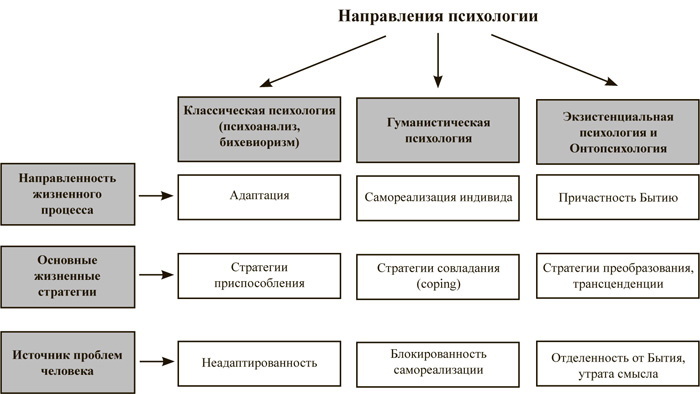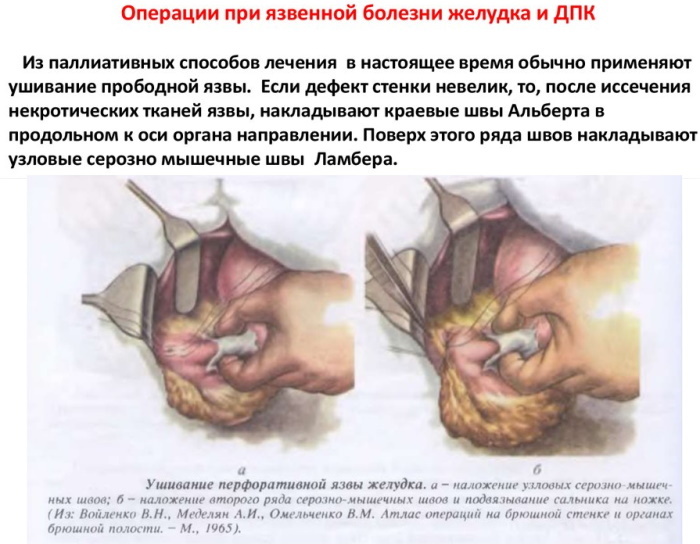Content
- Indications for use
- Chemical composition
- Release form
- Pharmacodynamics
- Pharmacokinetics
- Application
- Children under 18
- For adults
- For pregnant
- For the elderly
- Contraindications
- Overdose
- Side effects
- Special recommendations
- Drug interactions
- Storage conditions and periods
- Conditions of dispensing from pharmacies
- Analogs
- Enterosgel
- Filtrum
- Polyphepan
- Video about the drug Polysorb MP
White powder is a popular and effective remedy for poisoning, which is often is used for patients and is called Polysorb. The drug is in a plastic jar, which makes it easier to use and allows, if necessary, to treat several people. The medication has positive properties for the patient's body, shortens the recovery period with varying degrees of poisoning.
Indications for use
Polysorb MP is an effective adsorbing medication that is actively used in case of body poisoning with various toxins and harmful substances.
The medicine has detoxification and adaptogenic properties, which helps prevent the development of complications against the background of toxic damage to the body.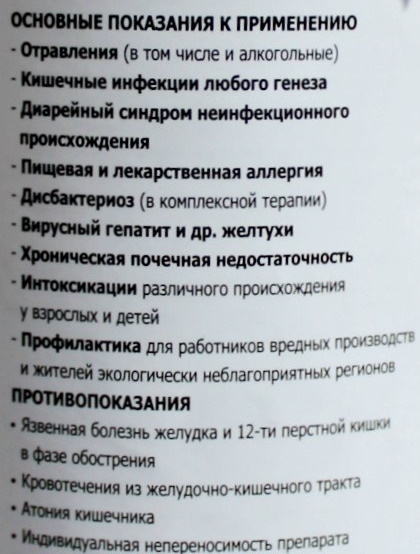
The main indications for the use of the medication:
- Acute and subacute intoxication in children and adults.
- Complications after poisoning therapy. The drug helps to reduce the number of negative reactions in severe pathological conditions.
- Increased levels of bilirubin and nitrogen in the blood as a result of impaired functioning of the liver and kidneys. The medicine is used in combination with other medicines to increase the effectiveness of therapy.
- Acute poisoning with various poisons and unknown components.
- Allergic reaction provoked by food or any medications. The drug is included in the course of the main treatment in order to prevent the progression of the condition.
- Septic and purulent pathologies, in which patients experience acute manifestations of intoxication in the form of headache, nausea, vomiting and fever.
- Violation of the intestinal microflora, which develops against the background of the use of antibacterial drugs, the intake of certain drinks or food. In this case, the drug is not used as the only method of treatment, but it is included in the course of the main therapy in order to accelerate the restoration of the bacterial balance.
- Intestinal infections, accompanied by repeated vomiting, stool disorder.
- Diarrhea of various forms of non-infectious origin. Sometimes the drug is indicated to improve a condition when other drugs do not correct the disorder.
- Endogenous toxicosis provoked by certain physiological conditions.
The medication in powder form can be used prophylactically if the patient has used poor-quality food or drink, as well as his professional activities related to work on production.
Chemical composition
White powder from poisoning in a plastic can, that is, Polysorb, contains colloidal dioxide in the composition of silicon. It is this ingredient that has pronounced detoxification properties and has a different effect on the patient's body.
The medicine does not contain auxiliary components of natural or synthetic origin, which makes it relatively safe for patients with a tendency to allergies to additional substances in different medications.
Release form
The medication is available to patients only in the form of an amorphous white powder. Sometimes the powder has a blue tint, which is not considered a deviation. When examined, this powder resembles light flakes, and when it comes into contact with water, a kind of suspension of a whitish hue is formed.
The powder is placed in paper bags or plastic cans of different sizes. In the first case, 1 bag contains 3 g of powder, in the second - 25 or 50 g. A can is considered a more practical solution, since it has a tight lid that prevents foreign objects and liquids from getting into the medicine, making it easier to transport.
The can is not placed in a special cardboard box, but all information about the application is indicated on its label attached to the container itself. The packages also indicate the nuances of application and dosage. The package is considered convenient for use at work or other places. The cost of 1 package starts from 40 rubles. The price of a can depends on the amount of powder in it and ranges from 20-450 rubles.
Pharmacodynamics
Polysorb is an enterosorbent of inorganic origin, which quickly removes toxic components from the body and prevents them from damaging internal organs. The medicine has a complex effect on the body, due to the evacuation of ingredients, it improves the general condition and prevents the appearance of complications against the background of destruction of organ cells by toxins.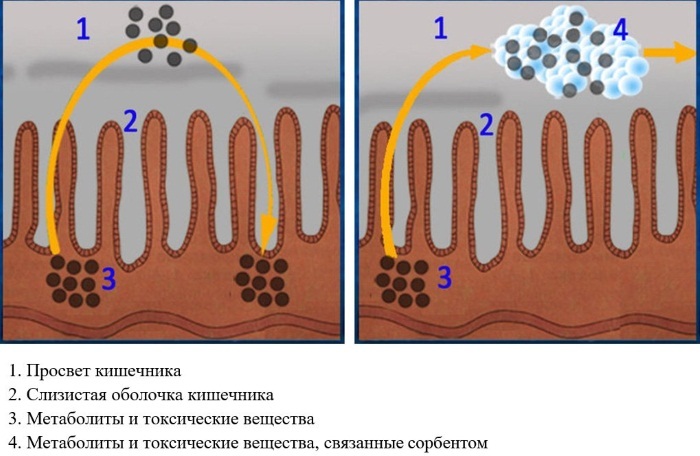
When a drug enters the digestive tract, exogenous and endogenous toxins are bound, followed by their elimination. The drug fights not only with components that have entered the body from the external environment, but also with toxins produced by the body in response to a particular violation.
As a result of cleansing, the work of internal organs is normalized, the general condition improves and the likelihood of complications decreases. The ability of the drug to remove toxins produced by bacteria and other pathogenic microorganisms is noted. The drug also removes heavy metal salts and decay products of ethyl alcohol.
Pharmacokinetics
White powder from poisoning in a plastic can (Polysorb) is often used for various conditions, which is associated with the rapid onset of the therapeutic effect. The patient feels relief within a few minutes after taking a single therapeutic dosage.
The drug, when it enters the digestive tract, is not absorbed into the systemic circulation, which is considered its advantage over many drugs. It does not accumulate in blood and tissues, does not penetrate various barriers.
After providing a therapeutic effect, the drug is evacuated with feces in an unchanged form for several hours.
Application
The medicine is taken only orally in a dosage prescribed by a specialist after a preliminary examination. Depending on the category of the patient and the symptomatology, the therapy regimen may differ.
Children under 18
It is allowed to use the medicine for the treatment of children from birth. The dosage is determined according to the weight of the child.
| Body mass | Dosage and application |
| Weight up to 10 kg | For such patients, the daily rate of the drug is 0.5-1 hours. l. It must be dissolved in 50-70 ml of boiled water at room temperature, after which it is given to the child in small portions during the day at approximately equal time intervals. The duration of therapy is determined individually. Usually 5 days is enough, but prolonged use is possible if necessary |
| 11-20 kg | The dosage for patients with this weight is 1 tsp. l of powder. As with other patients, the powder is pre-dissolved in 50 ml of water. The daily rate is divided into 2-4 doses during the day. Duration of treatment - 5 to 10 days |
| 21-30 kg | The amount of powder per 50-70 ml of water for patients with this weight is 1 hour. l, but with a slide. Reception is carried out throughout the day in approximately equal portions |
| 30-40 kg | The amount of powder per day is 2 hours. l. It is also dissolved in 50-70 ml of water and taken in equal portions throughout the day. |
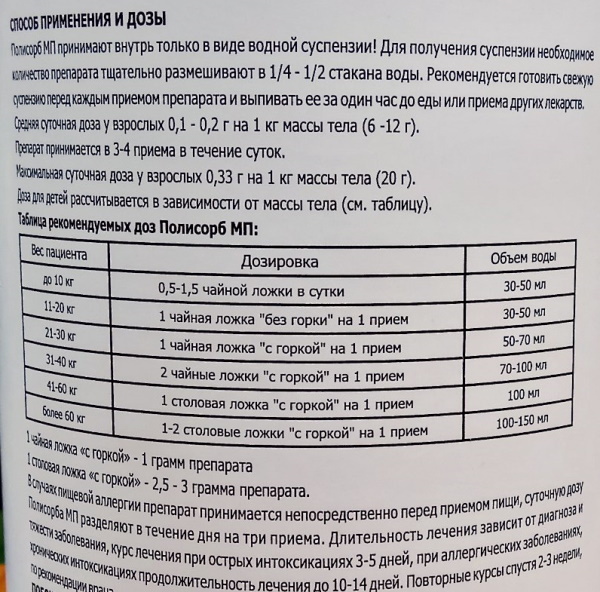
The duration of therapy is determined in each case individually after examining the patient.
For adults
Adults take the medication at the prescribed dose in the absence of contraindications. The standard rate for patients is 6-12 g per day, divided into 2-4 doses throughout the day at approximately equal intervals. When diluting, you need to take 100-120 ml of water.
The maximum dosage for a patient per day is 0.33 g per 1 kg of weight, but it is prescribed only if necessary and in a severe course of a pathological condition. Medication therapy lasts from 5 to 14 days, but can be continued for a longer period of time if the need arises. For example, in case of poisoning, treatment lasts no more than 7 days. In acute intestinal infections, the duration of the course is 4 days. Do not exceed the dosage or duration of therapy on your own.
For pregnant
White powder from poisoning in a plastic can can be used in the treatment of pregnant and lactating women if necessary. The dosage for such patients does not exceed 12 g per day, divided into 2-4 doses during the day.
Dilution and reception are carried out according to the standard scheme. In most cases, the medicine is used for toxicosis and related symptoms. The duration of therapy for a pregnant woman does not exceed 10 days, but the decision is made on an individual basis after examining the patient.
For the elderly
Elderly patients can take the medicine according to the standard scheme, like adults, there are no restrictions for them, if there are no contraindications. The daily dosage in most cases is 12 g of powder, diluted in 100-200 ml of water.
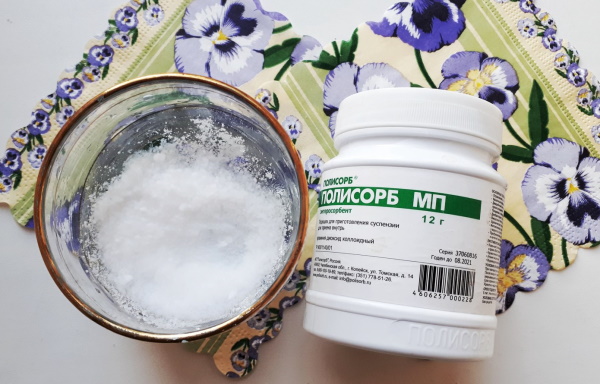
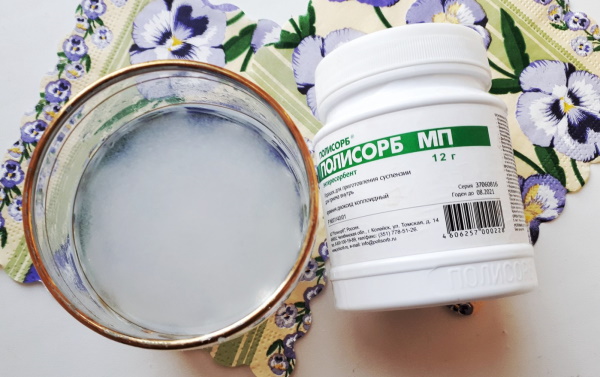
The medicine is taken 2 or 4 times a day in equal portions, and the duration of therapy is 14 days. If patients have severe pathologies of internal organs, the doctor can change the dosage and duration of use, but patients should not do this on their own.
Contraindications
The medicine has not many contraindications for use, which is associated with the relative safety for the body.
Barriers to drug therapy include the following conditions:
- Intolerance to the ingredients of the composition and a tendency to such reactions in the patient's history.
- Gastrointestinal bleeding that occurs against the background of damage to the walls of the stomach and intestines.
- Intestinal obstruction due to pathologies or as a result of surgical interventions.
- Acute peptic ulcer or gastritis with increased acidity of gastric juice. After the elimination of acute manifestations, it is allowed to use the medicine.
- Intestinal atony as a result of diseases or against the background of postoperative complications.
The drug is used with caution in the treatment of patients with chronic intestinal diseases. Individual contraindications are determined during the examination.
Overdose
White powder, which is in a plastic jar and is used to get rid of the symptoms of poisoning of varying degrees severity, does not provoke an overdose, since its main ingredient is not absorbed into the blood and does not accumulate in the body.
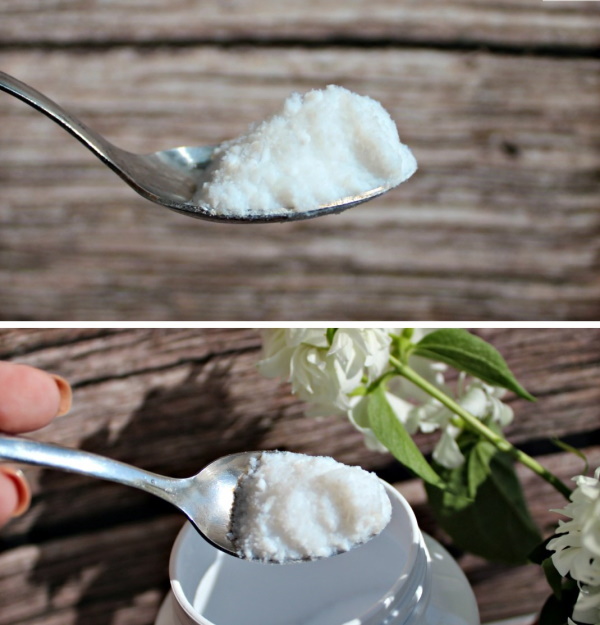
To date, there are no data on cases of drug overdose, even with prolonged use at high doses.
Side effects
Sometimes, during therapy, negative reactions occur, which can be aggravated in the absence of special treatment. Experts pay attention to the fact that compliance with all recommendations does not guarantee the absence of complications, but violation of the instructions often leads to similar reactions.
Common negative manifestations:
- Pain in the stomach, nausea and bouts of vomiting. Such complications are rare, usually in patients with a history of chronic diseases of the digestive system.
- Persistent constipation, accompanied by flatulence and bloating, pain.
- Impaired absorption of calcium in the body.
- Headache and weakness, fatigue.
- Decreased appetite, great thirst and dryness of the mucous membranes of the mouth.
- Heartburn. A similar complication in most cases appears in a patient with a history of gastritis with increased acidity of gastric juice.
Symptoms can disappear on their own after refusal of therapy, but the appointment of funds to normalize the condition is often required. The patient alone should not use any medication at home. It is also forbidden to ignore the symptoms.
Special recommendations
It is better to take the drug before meals for 1 hour, which will allow the drug to have a pronounced effect and somewhat reduce the likelihood of complications.
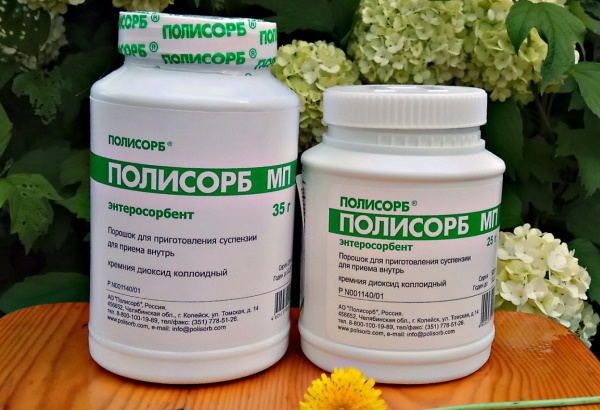
The taste of the finished medicine can be unpleasant, especially for children. But it is not recommended to add the powder to juice or tea, this can weaken the therapeutic effect and lead to complications. It is strictly forbidden to take the powder inside dry.
Drug interactions
White powder from poisoning in a plastic can (Polysorb) should not be combined with drugs with similar properties, which is associated with an increased risk of complications.
If it is necessary to prescribe medications with antacid, antiemetic and antispasmodic medications, it is necessary to take a break between the use of at least 2 hours. This will prevent the development of complications with incompatibility of medications.
The effect of Nicotinic acid and Simvastatin is enhanced when used simultaneously with Polysorb. In each case, the decision to prescribe several medications is made by the doctor after a preliminary examination of the patient.
Storage conditions and periods
The drug can be stored for 5 years. The production date is indicated on the packaging. After its expiration, it is forbidden to use the medicine. During storage, it is important to exclude exposure to sunlight and moisture. The finished suspension can be stored for no longer than 2 days.
Conditions of dispensing from pharmacies
Dispensing of medicines in different pharmacies is carried out without presenting a prescription form from a doctor, which makes it easier to purchase.
Analogs
In the absence of a drug in pharmacies or the impossibility of prescribing it for various reasons, substitutes with similar properties may be selected. Some have a different composition, which is not considered an obstacle to appointment.
Enterosgel
The drug is from the group of enterosorbents, which can be used in case of poisoning, liver pathologies of toxic origin. The medication is available in the form of an oral gel, which makes it easier to administer. The gel is used in its pure form, it does not need to be dissolved.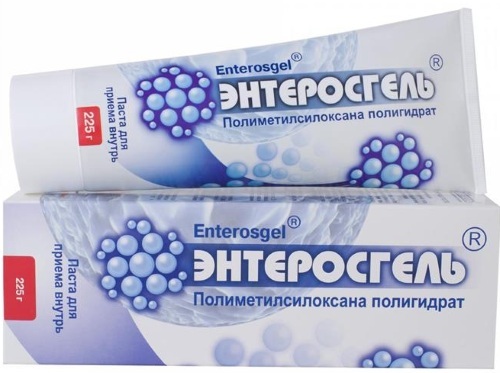
When using it, it is recommended to drink the gel with a sufficient amount of water, which will facilitate the distribution of the components along the digestive tract. Unlike the original, the analogue has more indications for use, it is often included in the course of the main treatment for diseases not associated with poisoning the body.
Filtrum
Enterosorbent in tablet form, which acts due to the presence of hydrolysis lignin. The drug is prescribed for poisoning of various origins, as well as conditions accompanied by intoxication.
The medicine is taken orally at the prescribed dosage, the duration of therapy is 10 days. Unlike Polisorb, an analogue is more often prescribed to patients over 1 year old. During pregnancy and breastfeeding, tablets are used only according to indications and in urgent need.
Polyphepan
An analogue of an agent with other therapeutic properties, which is often used to treat patients with various forms of poisoning. The medicine has adsorbing properties, weakens the negative effects of toxins on the patient's body.
The substitute differs from the original, as it is produced not only in the form of a powder, but also in the form of granules, tablets for oral use. The drug is indicated for children and adults, it is often prescribed when diagnosing endogenous or exogenous poisoning.
Additionally, the substitute normalizes the work of the digestive tract, prevents the development of indigestion and other complications from the digestive system.
A white powder used to relieve symptoms of poisoning is considered one of the safest drugs. Polysorb is in a plastic jar that is easy to use. The medicine is prescribed only by a specialist after a preliminary examination and determination of the cause of the poisoning. If it is necessary to use analogs, it is forbidden to select them yourself.
Video about the drug Polysorb MP
What helps with poisoning? Polysorb:


